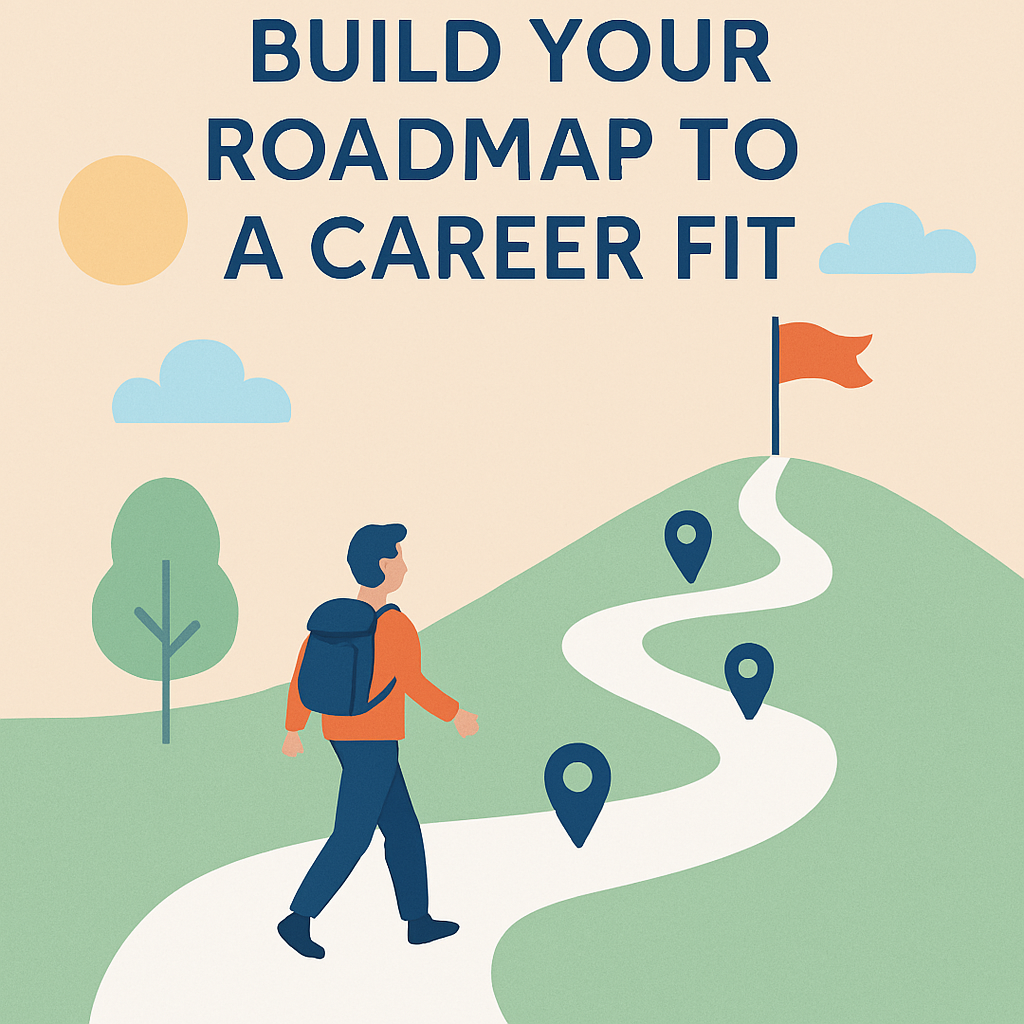If you thought final exams were the hard part, surprise—you’re just getting warmed up. The real challenge starts once the cap and gown come off. Career confusion after school is incredibly common, and honestly, it makes total sense. You’ve spent years following a set routine, and now you’re handed a blank canvas and told to “paint your life.” No pressure, right?
Let’s break it down in a way that feels a little less scary and a lot more empowering.
1. School Teaches You Subjects—Not How to Choose a Life
Here’s the thing: school teaches you formulas, grammar rules, and historical timelines, but it rarely teaches you how to figure out what lights you up inside. You spent over a decade mastering essays and algebra but probably never had a class called “Finding Your Purpose 101.”
It’s no wonder career confusion after school hits like a ton of bricks. Suddenly, you’re expected to know what fits you without ever getting real practice in trying things out. So give yourself a break if you feel overwhelmed—it’s not that you’re clueless, it’s that the system didn’t prioritize helping you know yourself.
Real work now means exploration. It means asking: What kind of problems do I love solving? What type of environment helps me thrive? What do I lose track of time doing? Those answers don’t come from textbooks; they come from living, trying, and sometimes messing up.
2. Your Degree Is Just a Launchpad, Not a Contract
A huge myth that fuels career confusion after school is the idea that your degree locks you into one path forever. Spoiler alert: it doesn’t. Your diploma is more like a permission slip to explore, not a binding agreement.
Sure, your studies gave you tools, but how you use them is totally up to you. Majored in biology but dreaming of marketing? You’re not crazy—you’re evolving. Started in computer science but love design? Welcome to the club of real humans who grow beyond a course catalog.
The real work after graduation is about reinventing yourself over and over until you land somewhere that feels aligned. Your major is part of your story, but it’s not the whole novel. And the best part? You get to keep writing new chapters anytime you want.
3. Building a Career Isn’t Linear—It’s Like Wandering Through a Giant Mall
You probably thought life after school would feel like climbing a nice, neat staircase. Instead, it’s more like wandering around a giant mall where none of the stores have clear signs. You peek into some shops, try stuff on, get lost, and eventually find something that fits. (Or at least fits for now.)
Career confusion after school often feels frustrating because no one tells you that meandering is normal. You’re not supposed to know all the answers right away. Trying different jobs, internships, volunteer gigs, or even passion projects is part of figuring it out. It’s not wasted time—it’s discovery.
Think of every new experience like trying on outfits. Some will feel like scratchy sweaters. Others will feel like slipping into your favorite hoodie. And that’s how you build a life that fits—not by guessing from the outside but by actually trying things on.
4. Your First Job Isn’t Your Forever Job (And Thank Goodness for That)
Raise your hand if you thought you had to land your dream job straight out of school. Guess what? Almost no one does. Your first (or second or third) job is not your final destination—it’s just your training ground.
Every role teaches you something valuable, even if it’s what you don’t want. Maybe you discover you hate cubicles but love collaborating. Maybe you learn that managing people drains you, but project planning lights you up. Every experience adds a piece to your career puzzle.
So when career confusion after school hits—and it will—remind yourself: you’re building wisdom, not failing. Each step, even the awkward or messy ones, is moving you closer to work that actually feels good.
How to Map a Path with No Directions
If you’re feeling like you got dropped into the middle of a giant maze with no map after graduation, you’re not alone. Career confusion after school is real—and honestly, it’s kind of the norm. No one hands you a personalized GPS with clear instructions like, “Turn left at Dream Job Boulevard.” But the good news? You don’t need perfect directions to get where you’re meant to go.
Here’s how to start moving forward even when you’re not totally sure where “forward” is yet.
1. Start with Curiosity, Not a Blueprint
When you graduate, it’s super tempting to feel like you need a 10-year plan immediately. Spoiler: most people don’t stick to their original plan anyway. (And honestly, thank goodness for that.)
Instead of trying to plot every step perfectly, lean into curiosity. Ask yourself questions like:
What sounds interesting right now?
What am I excited to learn more about?
Where do I feel energized, even if I’m still a beginner?
The goal isn’t to find the answer on the first try—it’s to follow the little sparks of interest and see where they lead. Career confusion after school is often just a signal that it’s time to explore, not panic.
You don’t need a full plan yet. You just need a starting point.
2. Think Small Steps, Not Giant Leaps
One of the biggest mistakes people make during career confusion after school is thinking they need to land their “forever job” immediately. Newsflash: you’re not buying a house—you’re just picking your next experiment.
Instead of stressing over finding the one, think about your next best small step. It could be:
Taking a free online course that intrigues you.
Volunteering at an organization that does work you admire.
Asking someone in a job you’re curious about for a coffee chat.
Each small move gives you new information. You’ll either think, “Wow, this is awesome!” or “Nope, not for me!” Either way, you’re learning—and that’s way better than staying stuck overthinking it.
Remember: progress isn’t about giant, dramatic leaps. It’s about consistent, curious nudges forward.
3. Build Your Own Compass, Not Someone Else’s Map
One sneaky reason career confusion after school feels so overwhelming? You’re bombarded with everyone else’s maps.
Parents might want you to take the “safe” route. Friends might chase high-paying jobs that don’t light you up. Social media shows you highlight reels of people “living their dreams” at age 23.
Here’s the truth: none of those maps were built for you. Your career isn’t supposed to look like anyone else’s—and that’s actually a huge relief when you think about it.
Building your own compass means tuning into your values, strengths, and lifestyle dreams. Ask yourself:
What do I care about more than money or titles?
What kinds of problems do I want to help solve?
What kind of day-to-day life would make me excited to wake up?
Your compass doesn’t have to tell you exactly where to go yet. It just needs to point you in the right direction—toward something that feels true to you.
When you build a career around your compass, instead of chasing someone else’s map, you find alignment—not just a paycheck.
4. Permission to Pivot (Again and Again)
Repeat after me: I am allowed to change my mind.
Career confusion after school often feels scary because it feels final. Like if you pick the wrong thing now, you’re locked into it forever. But real talk? You’re not. Career paths today are anything but straight lines.
You might start in marketing, pivot to UX design, dabble in coaching, then build your own business—all before you’re 35. (Honestly, that’s the reality for a lot of people now.) Each step teaches you something that shapes the next step. Nothing is wasted.
So if you pick something and realize it’s not your forever thing? That’s not failure. That’s data. That’s growth. That’s you getting closer to a path that actually fits.
Allowing yourself the freedom to pivot takes so much pressure off your decisions. It lets you move forward without needing to be 100% sure all the time.
And honestly, when you stop trying to get it “perfect,” you usually end up finding something even better than you imagined.
What to Do If You’re Not Feeling Ready
Let’s be honest—“adulting” doesn’t come with a cheat sheet, and post-grad life can feel like being shoved onstage without a script. If you’re sitting at your desk Googling things like “what to do with my life” or “is it bad to not have a five-year plan,” just know—you’re in good company.
Career confusion after school isn’t a personal failure. It’s actually the most common side effect of growing up in a world that teaches math over mindset, and Shakespeare over self-awareness. So if you’re not feeling ready, don’t panic. You don’t need to be ready—you just need to be real with yourself.
1. You Don’t Need It All Figured Out (Seriously)
Let’s toss the idea that you need a fully formed plan before you start moving. Spoiler: no one feels 100% ready when they begin something new. Even the most successful people you admire once stared at job boards thinking, “Uh… what now?”
Feeling unsure doesn’t mean you’re behind—it means you’re thinking. That’s a good sign. It means you’re not rushing into things for the sake of checking a box.
The truth is, readiness often follows action—not the other way around. You take one small step, feel a little more confident, and then the next step gets clearer. It’s okay to start messy, unsure, or nervous. Clarity grows when you’re in motion.
So instead of waiting to feel ready, try something low-stakes. Apply to one job that sounds kind of interesting. Sign up for a free online course. DM someone in a field you admire and ask them how they got started. One brave move is better than a perfect plan.
2. Start Where You Are, Not Where You Think You Should Be
Comparison is the thief of progress—and social media is its getaway car. It’s way too easy to scroll through someone’s curated “dream job” update and spiral into, “Why am I not there yet?”
Here’s the secret: everyone’s timeline is different, and yours is not broken.
If your peers are landing internships, getting promoted, or launching YouTube empires, cool for them! But if you’re still figuring out what you even like doing, that’s also valid.
Start with who you are now. What lights you up a little? What parts of your part-time job or side hustle bring you joy? What’s one thing you’ve always been curious about but never tried?
You’re not late. You’re not wrong. You’re in discovery mode—and that’s a super important part of the process that people rarely show online.
Remember, every expert started out clueless, too. Let yourself be a beginner. Start from your now—not someone else’s highlight reel.
3. Turn “I’m Not Ready” Into “I’m Learning”
When career confusion after school kicks in, it’s easy to freeze. You convince yourself that you don’t have enough experience, enough skills, or enough whatever to start anything. But here’s a wild thought: what if not knowing yet is actually your advantage?
Curiosity is one of your biggest superpowers right now. You’re not locked into one identity or path. You get to try things, experiment, and explore before committing to anything long-term.
Instead of saying, “I’m not ready,” try flipping it to: “I’m learning.” Learning doesn’t require perfection—it just requires participation.
You can learn by:
Taking a class (free or paid—YouTube University counts too)
Talking to people in different fields
Trying a short-term project, internship, or gig
Every new experience is data. Even if something doesn’t work out, you’re collecting information about what fits and what doesn’t.
“I’m not ready” becomes “I’m gathering clues.” And suddenly, the pressure to get it “right” fades—and you’re just moving forward, one clue at a time.
4. Find a Support System, Not Just a Job Title
You weren’t meant to figure this all out alone. You can journal, Google, and daydream your way into exhaustion—but nothing beats having a few humans in your corner.
Whether it’s a mentor, a coach, a former teacher, or a friend who just gets it—surround yourself with people who can reflect your strengths back to you when you forget. Career confusion after school can feel heavy, but it gets a lot lighter when you’re not carrying it solo.
And don’t be afraid to ask questions. Most people love to share how they got started, especially because they remember how confusing it was, too. You don’t have to have the right words or polished resume—just genuine curiosity and the courage to start a conversation.
Also: don’t underestimate the value of professional guidance. Career coaches (like, ahem, me) exist for this very reason. You don’t need to wander the maze alone when someone has a flashlight and a map.
Career Experiments to Try Right Now
So, you’ve graduated, your diploma is collecting dust, and everyone’s asking what you’re doing with your life. Cue the career confusion after school panic spiral.
But here’s the truth: you don’t need a 10-year plan. You just need a few bold little experiments to see what sticks. Think of your career journey like trying on outfits—you won’t know what fits until you try a few on.
Spoiler alert: you’re allowed to try stuff without committing forever. Let’s dive into some career experiments that’ll help you feel things out (without wrecking your sanity).
1. Volunteer for a Day (or a Week!)
Volunteering is basically a no-pressure career simulator. You can dip your toes into different fields, meet interesting people, and learn what you love (or hate)—all while making the world a little better.
Try volunteering at:
A local nonprofit (think: social media, admin help, or events)
A community art center or creative program
A tech meet-up or coding club (no experience needed—just curiosity)
You’ll get to see what a job in that space feels like, without having to send a resume or update your LinkedIn headline.
Bonus: it looks great on your resume and gives you stories to tell during interviews.
2. Run a Low-Stakes Side Hustle
Let’s not call it a “business.” Let’s call it an experiment with potential. Trying a side hustle lets you explore your skills, interests, and limits in a way a traditional job might not.
You could:
Sell handmade jewelry or crafts on Etsy
Offer baking or pet-sitting services in your neighborhood
Do commissions for art, editing, or logo design
Start a niche podcast or blog on something you’re curious about
It’s not about going viral or making millions. It’s about seeing what energizes you. You might find that building your own thing feels way better than clocking in.
And hey, if it flops? You still learned something. You still grew.
3. Shadow Someone in a Job That Intrigues You
Career confusion after school is often just a lack of exposure. You don’t know what you want because you don’t know what’s out there.
Reach out to:
A family friend who works in healthcare
Someone you follow who freelances in media or marketing
A former teacher who now works in corporate learning
Ask if you can shadow them for a day, or even just hop on a Zoom to learn about their day-to-day. Most people love talking about themselves—especially when you come in with genuine curiosity.
Seeing someone else’s work life up close can open doors, spark ideas, or show you what definitely isn’t your vibe. All of it is useful.
4. Try a “Passion Project” You Actually Care About
You know those ideas that live rent-free in your brain, but you never start them because they’re “not productive”? Yeah—start one.
That mini docuseries you want to film on your phone? That TikTok account where you review funky snacks? That idea to write a children’s book? Do it. Not because it’ll land you a job. Do it because it helps you learn what you love to create, what excites you, and what skills you enjoy using.
Career clarity often lives inside those side passions. You just have to give them a little sunlight and see what grows.
5. Enroll in a Micro-Course or Online Challenge
You don’t need a master’s degree to learn a new skill. You need a laptop, some Wi-Fi, and a curiosity spark.
Platforms like Skillshare, Coursera, and FutureLearn offer micro-courses in everything from graphic design to data science to personal branding. Many are free or super affordable.
Try a 7-day challenge like:
“Learn to build a website from scratch”
“Write a short story every day for a week”
“Design a mood board for your dream career”
You’ll either discover something you love—or something to cross off the list. Either way, you’re making progress.
6. Conduct Informational Interviews (It’s Not as Awkward as It Sounds)
Think of these like casual coffee chats. No suits, no pressure, no “why should we hire you?” energy.
Just ask someone in an industry you’re curious about: “Can I ask you a few questions about your career path?” You’ll learn way more from a 15-minute convo than from 2 hours of reading vague job descriptions online.
These convos can lead to:
Clarity about whether a field fits you
Insider tips and tools you didn’t know existed
Connections that could help you down the road
👉 Want help turning your insights into action? Check out my Career Compass tools and services




